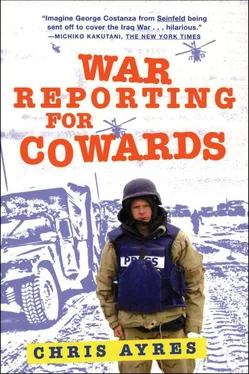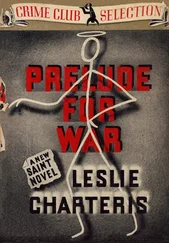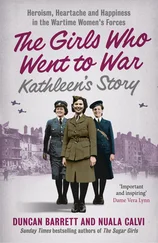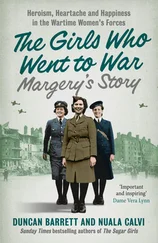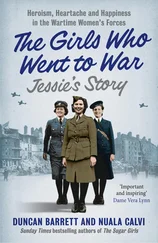Крис Айрс - War Reporting for Cowards
Здесь есть возможность читать онлайн «Крис Айрс - War Reporting for Cowards» весь текст электронной книги совершенно бесплатно (целиком полную версию без сокращений). В некоторых случаях можно слушать аудио, скачать через торрент в формате fb2 и присутствует краткое содержание. Город: New York, Год выпуска: 2005, ISBN: 2005, Издательство: Grove Press, Жанр: Биографии и Мемуары, Юмористические книги, nonf_military, на английском языке. Описание произведения, (предисловие) а так же отзывы посетителей доступны на портале библиотеки ЛибКат.
- Название:War Reporting for Cowards
- Автор:
- Издательство:Grove Press
- Жанр:
- Год:2005
- Город:New York
- ISBN:978-1-5558-4594-0
- Рейтинг книги:5 / 5. Голосов: 1
-
Избранное:Добавить в избранное
- Отзывы:
-
Ваша оценка:
- 100
- 1
- 2
- 3
- 4
- 5
War Reporting for Cowards: краткое содержание, описание и аннотация
Предлагаем к чтению аннотацию, описание, краткое содержание или предисловие (зависит от того, что написал сам автор книги «War Reporting for Cowards»). Если вы не нашли необходимую информацию о книге — напишите в комментариях, мы постараемся отыскать её.
War Reporting for Cowards — читать онлайн бесплатно полную книгу (весь текст) целиком
Ниже представлен текст книги, разбитый по страницам. Система сохранения места последней прочитанной страницы, позволяет с удобством читать онлайн бесплатно книгу «War Reporting for Cowards», без необходимости каждый раз заново искать на чём Вы остановились. Поставьте закладку, и сможете в любой момент перейти на страницу, на которой закончили чтение.
Интервал:
Закладка:
Another round of lume showed that the howitzers had missed their targets: hardly surprising, given the wind, which had probably blown the rounds off course by miles. The Iraqi tanks were still chewing up the mud and heading straight for us. Their commanders probably thought they would get a chestful of medals from Saddam for this: taking out half a convoy of U.S. artillery, stranded in the dark. I imagined Saddam, his Big Brother features crumpled into a dictatorly smile, tenderly pinning honors to the Iraqis’ olive drab uniforms. Tears would well up in their puppy-dog eyes. “You destroyed the American infidels!” Saddam would say.
Then, over the radio, came the message we had all wanted to hear—but thought was impossible because of the weather. “We’re sending in some F-15s,” said the bass monotone, meaning fighter jets—probably from one of the American aircraft carriers I had so desperately tried to get on.
Buck, who had been silently staring at the crucifix hanging from the Humvee’s dashboard, slapped his palm down on the radio. “Ladies and gentlemen,” he said, “the F-15s are in da house!”
Then came the catch. “They’ll be thirty mikes,” said the monotone, meaning minutes. There was a fizz of static. Then silence.
2
A PROUD LINE OF COWARDS

My name is Chris Ayres, and I never wanted to be a war correspondent. To me, war reporters were a different species: fearless and suntanned outdoors types who became Boy Scout leaders at school, studied Latin and Urdu at Oxford, and probably knew the correct way to eat a sheep’s penis at the table of an African warlord. I felt a mixture of envy and bafflement at their careers. Before I was sent to Iraq, I could have imagined doing Dan Rather’s or Walter Cronkite’s job no more than I could have imagined becoming an Olympic javelin thrower.
Growing up, the enduring image I had of a war correspondent was Martin Bell, the BBC man in his trademark white linen suit, who took a direct hit from mortar shrapnel while reporting live from Sarajevo in 1992. “I’m all right, I’ll survive,” were Bell’s stoic words as he collapsed into a pool of his own blood. There was a thrilling, implicit machismo to Bell’s work, betrayed by the title of his memoirs: In Harm’s Way . Bell, always the self-deprecating hero, could barely bring himself to mention the mortar incident in the book. I hated to think of the piercing, girlish squeal, followed by the involuntary bowel movement, that would have been broadcast into the homes of BBC viewers if it had been me in Sarajevo instead of Bell. The profanity I would have unleashed upon being hit, however, would probably have ensured that the satellite feed was cut long before it reached London.
When I first joined The Times , the paper’s best-known war correspondent was a lunatic called Anthony Loyd—a heroin addict who left his job as a platoon commander in the British army for a career in journalism because, he later confessed, he saw it as a “passport to war.” To me, Loyd’s life seemed like an endless, heart-pounding sequence from Apocalypse Now —but with no “stop” button to end the action. Loyd’s motivation for joining The Times was very different from my own. If I saw journalism as a passport to anything, it was fun . I wanted to meet celebrities, dine at Michelin-starred restaurants, and feel important at parties. I fantasized about pontificating on world events, penning witty op-ed columns, and profiling politicians and rock stars—all from the comfort and safety of an air-conditioned office in London.
Most of all, perhaps, I wanted my writing to impress exotic, intellectual girls with exciting curves. It’s fair to say that taking mortar fire didn’t feature, at all, in my decision to take a job in the news business.
To me, war reporting was a guarantee of a premature single-column obituary, printed alongside an unflattering headshot, in my own newspaper. I remembered reading about Ernie Pyle, the all-American farm boy from Indiana, who forced himself, out of duty, to live on the front lines during World War II. Pyle described his chance to cover the D-day landings in 1944 as “like an invitation from the White House: something you don’t refuse.” He was less lucky than Bell. After making the front cover of Time magazine and winning a Pulitzer Prize for his dispatches from the European battlefront, Pyle’s career at the powerful Scripps-Howard newspaper chain ended abruptly with a bullet from a Japanese machine gun.
When I returned to Los Angeles from the Gulf, I searched for books by Pyle, and other war correspondents, to convince myself that my conduct in Iraq hadn’t been a total disgrace. The book jackets, however, provided me with little reassurance. There was Pyle, his woolly hat and goggles pulled down over his military crew cut, the cigarette wedged between his cracked lips. He was an “aw-shucks” everyman; one of the boys. And the boys, of course, loved him. Then there was the cover shot of the Washington Post ’s Neil Sheehan, the veteran Vietnam correspondent. He was wearing black aviator shades and sitting, shirt unbuttoned and notebook poised, in front of a rifle rack. Sheehan’s expression, like Pyle’s, betrayed his role: the pen pausing for thought; the lip curled in disbelief and disillusionment.
And then I thought of the picture of me, somewhere in those miserable, windy marshlands, stuffed into an oversized chemical suit with a stupid blue helmet on my head, squinting myopically into the dust and the sun. I had even taken my glasses off for the picture, because I thought it might make me look cooler. But the message of the photograph is clear: I want to go home. When I look at it now, I think of my brief and largely inept stint in Mesopotamia.
And I wonder how on earth I became a member of Pyle and Sheehan’s elite, noble, and fucked-up profession.
My father hates fairground rides, airplanes, and fast cars. In fact, he enjoys joking that I come from a long and proud line of cowards. This is odd, given our family name. The first Ayres was, in fact, a Truelove, and a follower of William the Conqueror, the Frenchman who successfully invaded England in 1066 at the Battle of Hastings. In the sweat of battle, William was flung off his horse and saved only by the fearless Truelove, who pulled him up from the mud and wrenched off his battered helmet, which was suffocating him. According to an entry in the royal land deeds of Battle Abbey, East Sussex, William told him: “Thou shalt hereafter from Truelove be called Eyre, because thou hast given me the air I breathe.” Eyre, however, didn’t have a good war and was found in a ditch with his leg and thigh cut off. The king ordered Eyre to be looked after, and, in reward for his loyalty, gave him land in Derby and a family crest, featuring an amputated leg and thigh, clad in armor. The name Eyre eventually became Eyres before mutating into the modern form, Ayres.
Fearlessness wasn’t an Ayres family trait that survived into the twentieth century. When I was a child in the eighties, my family would spend three brutal days driving to southern France for our annual summer holiday, largely because Dad was afraid of flying. On the highways and expressways we did a steady sixty-five miles an hour in our little Renault 9. And when the carnival visited our hometown, my dad would always refuse to take me on the Ferris wheel. “I’m not going on that bloody thing,” my father would say after taking one look at the pot-smoking carnie operating the machinery. Later, when I was learning to drive, my dad was the worst passenger imaginable, stomping his foot on a phantom brake pedal when even the gentlest of bends approached. Once, when I accidentally reversed my chocolate brown Austin Metro into a wall, I thought he was going to have a cardiac arrest. He hated physical danger.
Читать дальшеИнтервал:
Закладка:
Похожие книги на «War Reporting for Cowards»
Представляем Вашему вниманию похожие книги на «War Reporting for Cowards» списком для выбора. Мы отобрали схожую по названию и смыслу литературу в надежде предоставить читателям больше вариантов отыскать новые, интересные, ещё непрочитанные произведения.
Обсуждение, отзывы о книге «War Reporting for Cowards» и просто собственные мнения читателей. Оставьте ваши комментарии, напишите, что Вы думаете о произведении, его смысле или главных героях. Укажите что конкретно понравилось, а что нет, и почему Вы так считаете.
